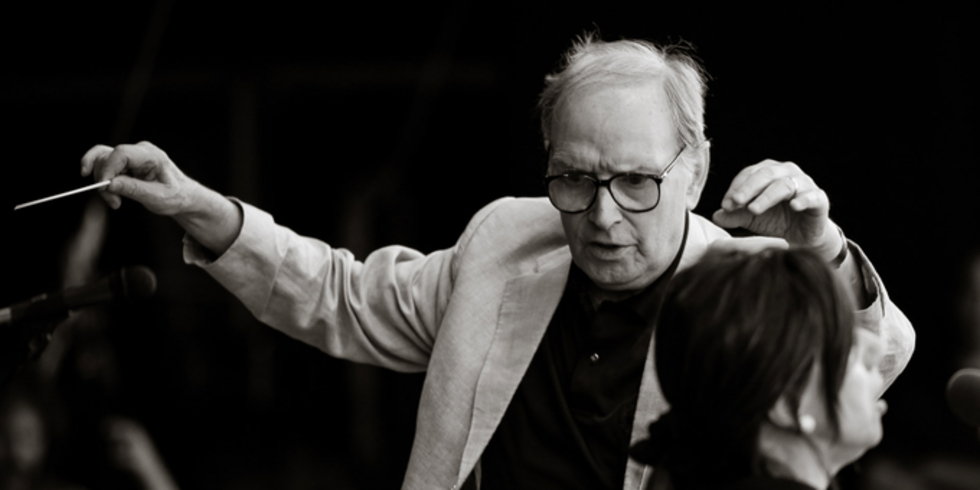Playlist: Ennio Morricone – A Fistful of Scores

From A Fistful of Dollars to his 2015 Oscar winning score for Quentin Tarantino’s The Hateful Eight, we all know the work of Ennio Morricone, who has died aged 91. Here, with a few of his most iconic compositions, Mike Pinnington celebrates a career at the top…
We all know the music of Ennio Morricone – probably even have a favourite, whether we know it was written by him or not. Little wonder: for, astonishingly, his was a career that took in hundreds of film and TV scores over the course of 70 years, and he referred to them as “my children… every score I’ve done.” For those with a passing interest, it is probably the sound of the Spaghetti Western, many of them directed by his friend Sergio Leone, that he is best remembered for. Indeed, it was Leone who invited him to write the soundtrack that would change the course of his professional and, arguably, personal life. That film, of course, was Per Un Pugno di Dollari – or, as it’s perhaps better known, A Fistful of Dollars.
While many a film score – even the best ones – remain anonymous and in the shadow of the thing they exist to accentuate and elevate, Morricone’s and Leone’s was a true collaboration, and the director retained the services of his friend for the rest of his career. In 1968 this partnership would lead to Once Upon a Time in the West becoming one of the top five best-selling original scores of all time, racking up some 10 million copies sold worldwide. You could be forgiven, then, for thinking the Western was where the man did his finest work – and, sure, it’s an argument you could easily make. After all he won his only Oscar for Quentin Tarantino’s 2015 film The Hateful Eight. (And it’s surely true that many won’t be able to separate poncho-wearing era Clint Eastwood from the music of Morricone.)
But, just as few audiences consume only one genre, Morricone ran the creative gamut in both America, and back home in Italy, where he continued to work even after Hollywood came calling. Explaining that he was disturbed when people thought of him as a specialist only of Westerns, he was on record as saying: “It could have been extremely boring to write musical scores for only Westerns… It was really exciting for me to work in all these various genres.” And, aside from his many projects with Leone, directors including Brian De Palma, Warren Beatty, Dario Argento, John Carpenter, Bernardo Bertolucci, Terrence Malick, Giuseppe Tornatore and Pedro Almodóvar clamoured for his services. If you watch films with any regularity at all, odds are that you will likely have sat through one or more, scored masterfully, by Ennio Morricone. In fact, so prolific was he and such was his longevity, that many of us could pick a top 10 films drawn solely from those he was associated with!
I started by making the observation that we all know a Morricone score. The composition of his I knew well without previously realising it is Chi Mai, written in 1971. Haunting and seductive, it featured in Maddalena (1971), in 1981 film Le Professionnel, and various TV productions. In 81, it reached number two in the singles chart. If that sounds remarkable, this wasn’t his first dalliance with the UK charts, having hit the number one spot with his theme for The Good, the Bad and the Ugly in 1968. Perhaps best exemplified by that score, whatever the genre, his sound was an experimental one, mixing recordings from real life (a coyote in the case of that film) with his own original music. Like the many successes his talent brought him, it was something of a trademark.
Put simply, his was the gift of music, a gift he’s bequeathed to us all, whatever our cinematic preference. As the maestro said: “If you scroll through all the movies I’ve worked on, you can understand how I was a specialist in westerns, love stories, political movies, action thrillers, horror movies, and so on. So in other words, I’m no specialist, because I’ve done everything. I’m a specialist in music.”
Mike Pinnington





